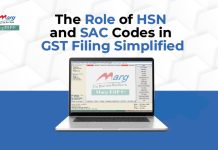Painting work is a skilled profession that involves the application of color and texture to walls, ceilings, and other surfaces to enhance the visual appeal of a building. The process of painting involves several materials, tools, and techniques, and it is essential to classify them under a standard nomenclature to ensure uniformity in tax laws and trade practices. This is where the Harmonized System of Nomenclature (HSN) Code for Painting Work comes into play.
What is HSN Code for Painting Work?
HSN Code is a standardized system of classification and coding of goods and services used for taxation and trade purposes globally. It is a six-digit code that helps identify the product, its components, and its origin, and determine its applicable tax rate. For Painting Work, HSN Code falls under the Chapter heading 96, which pertains to Miscellaneous Manufactured Articles.
The HSN Code for Painting Work is 9603, and it covers the following items:
- Brushes, rollers, and other tools used for painting
- Paints, varnishes, and other coatings for decorative or protective purposes
- Pigments, dyes, and other coloring matter
- Stencils and templates used for designing or marking
- Preparations used for cleaning or thinning paints or varnishes
How does HSN Code for Painting Work help?
The HSN Code for Painting Work is essential for the following reasons:
- Uniform Taxation: The HSN Code for Painting Work ensures uniformity in tax rates applicable to the products and services related to painting work. This helps avoid confusion and inconsistencies in tax laws and practices.
- International Trade: The HSN Code for Painting Work is recognized globally, which facilitates international trade by enabling accurate identification and classification of goods and services related to painting work.
- Improved Compliance: By using HSN Code for Painting Work, businesses can ensure better compliance with tax laws and regulations, avoiding penalties and legal issues.
Conclusion
HSN Code for Painting Work is an important tool for businesses and individuals involved in the painting work profession. It helps ensure uniformity in tax laws, facilitates international trade, and improves compliance. Understanding the HSN Code for Painting Work can also help businesses optimize their operations and manage their resources better.
Read more useful content:
Frequently Asked Questions (FAQs)
Q: What is HSN Code?
A: HSN Code is a standardized system of classification and coding of goods and services used for taxation and trade purposes globally. It is a six-digit code that helps identify the product, its components, and its origin, and determine its applicable tax rate.
Q: What is the HSN Code for Painting Work?
A: The HSN Code for Painting Work is 9603, and it covers items such as brushes, rollers, paints, varnishes, pigments, dyes, stencils, templates, and preparations used for cleaning or thinning paints or varnishes.
Q: How is the HSN Code for Painting Work useful?
A: The HSN Code for Painting Work is useful for businesses and individuals involved in the painting work profession as it ensures uniformity in tax rates, facilitates international trade, and improves compliance.
Q: How do I find the HSN Code for Painting Work for my product?
A: You can find the HSN Code for Painting Work for your product by consulting the official HSN Code list, which is available on the GST portal or the CBIC website. You can also seek the help of a tax professional or a knowledgeable supplier.
Q: What is the importance of HSN Code for Painting Work?
A: The HSN Code for Painting Work is important as it helps businesses avoid confusion and inconsistencies in tax laws and practices, facilitates international trade, and improves compliance with tax laws and regulations.
Q: Can the HSN Code for Painting Work change?
A: Yes, the HSN Code for Painting Work can change based on updates or amendments made by the government or international trade agreements.
Q: Is it mandatory to mention the HSN Code for Painting Work in invoices?
A: Yes, it is mandatory to mention the HSN Code for Painting Work in invoices for all taxable supplies of goods or services. This helps in the proper determination of tax rates and reduces the possibility of errors or disputes.




















